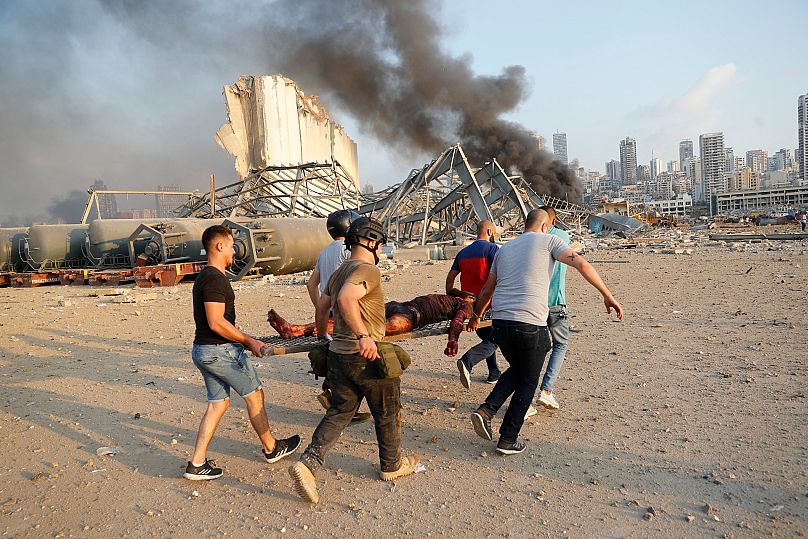The explosion took place at the port shortly before 19:00 local time (18:00 CET) with a large cloud of smoke billowing over the city. Eyewitnesses reported significant damage.
This article dates from Tuesday. Click here for the latest updates on Wednesday.
 ADVERTISEMENT
ADVERTISEMENT
 ADVERTISEMENT
ADVERTISEMENT
Dozens of people lost their lives and thousands more were injured on Tuesday after a massive explosion hit the Lebanese capital Beirut, the health ministry has said.
A tally released by Health Minister Hamad Hassan at around 22:45 CET put the death toll at more than 60 and the number of people wounded at over 3,000.
Minister Hamad Hassan, quoted by the local LBC television channel, described the tragedy as "a disaster in every sense of the word."
"The capital's hospitals are all filled with wounded people," he added.
Firass Abiad, CEO of the Rafik Hariri University Hospital had said earlier that "most have glass injury, some deep".
Emergency services have issued an urgent appeal for blood donations to deal with the influx of patients.
The explosion took place at the port shortly before 19:00 local time (18:00 CET) with a large cloud of smoke billowing over the city. Eyewitnesses reported significant damage.
It is unknown what caused the blast but the presidency said following an emergency meeting of the Supreme Council of Defense that an investigation should "determine responsibilities, especially given that security reports had indicated the presence of flammable and explosive materials in said ward".
Several witnesses present in Beirut said that this was the largest and most devastating explosion they had felt with people in Cyprus reporting feeling the blast.
'People were screaming, cars were blown'
Joelle Bassoul, a human rights worker in Beirut, was in the neighbourhood with her mother when they felt two shock waves.
"The first one was a big bang I immediately knew it was an explosion and like within seconds there was a second very strong shockwave," Bassoul told Euronews.
"People were screaming around us, a few cars were blown into the building," she added, explaining that when she returned to her apartment building nearby, it was completely destroyed.
She said that people in the streets were panicked and there was damage everywhere.
Luna Safwan, an independent journalist in Beirut, said that she felt the explosions in Baabda near the presidential palace, which is nearly ten kilometres away from the port.
She said her parents, who lived through the Civil War that lasted until 1990, had never felt anything like it.
"We didn’t expect that the impact would reach Baabda," she told Euronews, while explaining that people further away also felt the blast.
Samah Hadid of the Norwegian Refugee Council tweeted: "My apartment and building completely destroyed by Beirut explosion. People injured and hospitals are filling up. Hope everyone is safe. Praying for Beirut."
'A long night in the ER'
The Lebanese Red Cross urgently called all of its paramedics to respond to the explosion and dispatched more than 30 teams.
The Lebanese Presidency said in a statement that President Michel Aoun "gave instructions to all armed forces to work to address the repercussions of the big explosion and to conduct patrols in the affected districts of the capital and suburbs to control security."
Lebanon's health ministry said that hospitals should treat the injured at the government's expense and urged all medical personnel and health workers to volunteer at their nearest facility to treat those affected.
A neurosurgeon working in Beirut, Fred Bteich, tweeted saying that it would be a long night in the ER with patients "piled up" on the floor.
Hospitals are already dealing with a recent increase in COVID-19 cases in Lebanon, experts say.
Netblocks, which monitors internet service, showed a significant internet outage in Lebanon following the blast.
'We mourn each loss'
European Council President Charles Michel said that "the EU stands ready to provide assistance and support".
"My thoughts are with the people of Lebanon and with the families of the victims of the tragic Beirut blast," he wrote on Twitter, adding: "Stay strong".
French President Emmanuel Macron expressed his "fraternal solidarity with the Lebanese people" on Twitter.
"France stands alongside Lebanon. Always. French aid and resources are being delivered," he added.
Britain's Foreign Secretary, Dominic Raab, has also reacted to "the devastating explosion" in the Lebanese capital.
"The UK stands in solidarity with the people of Lebanon and is ready to offer help and support including to the British nationals impacted," he added.
Dorothy Shea, the US ambassador the country also offered her "heartfelt sympathies" to the victims and their families.
"We mourn each loss from this terrible tragedy alongside the Lebanese people," she wrote in a statement.
Israel, Iran and Qatar have also offered to provide assistance.











